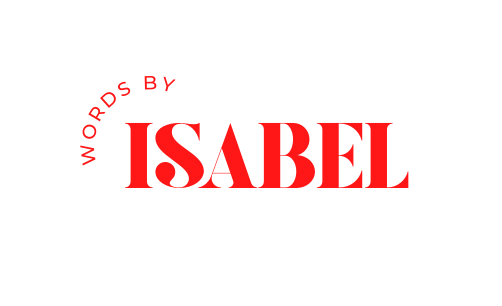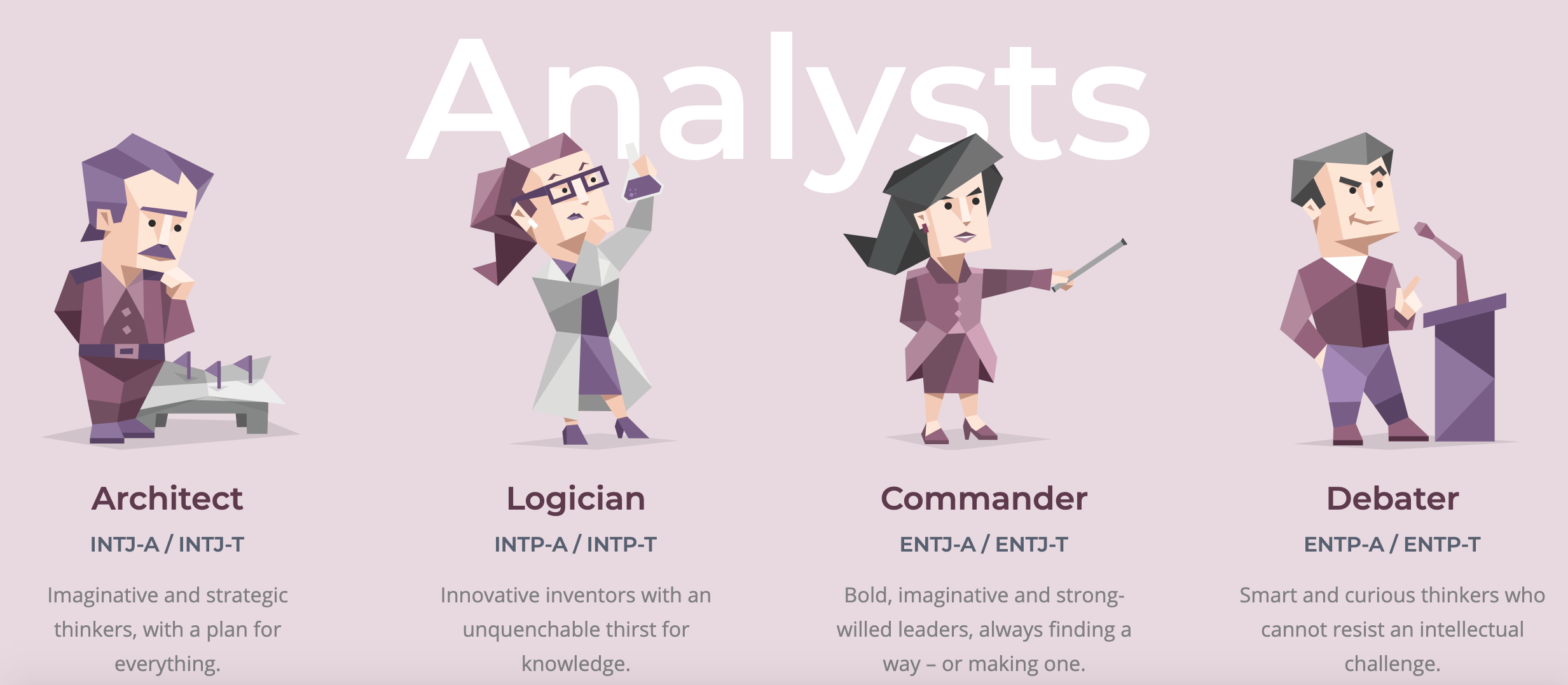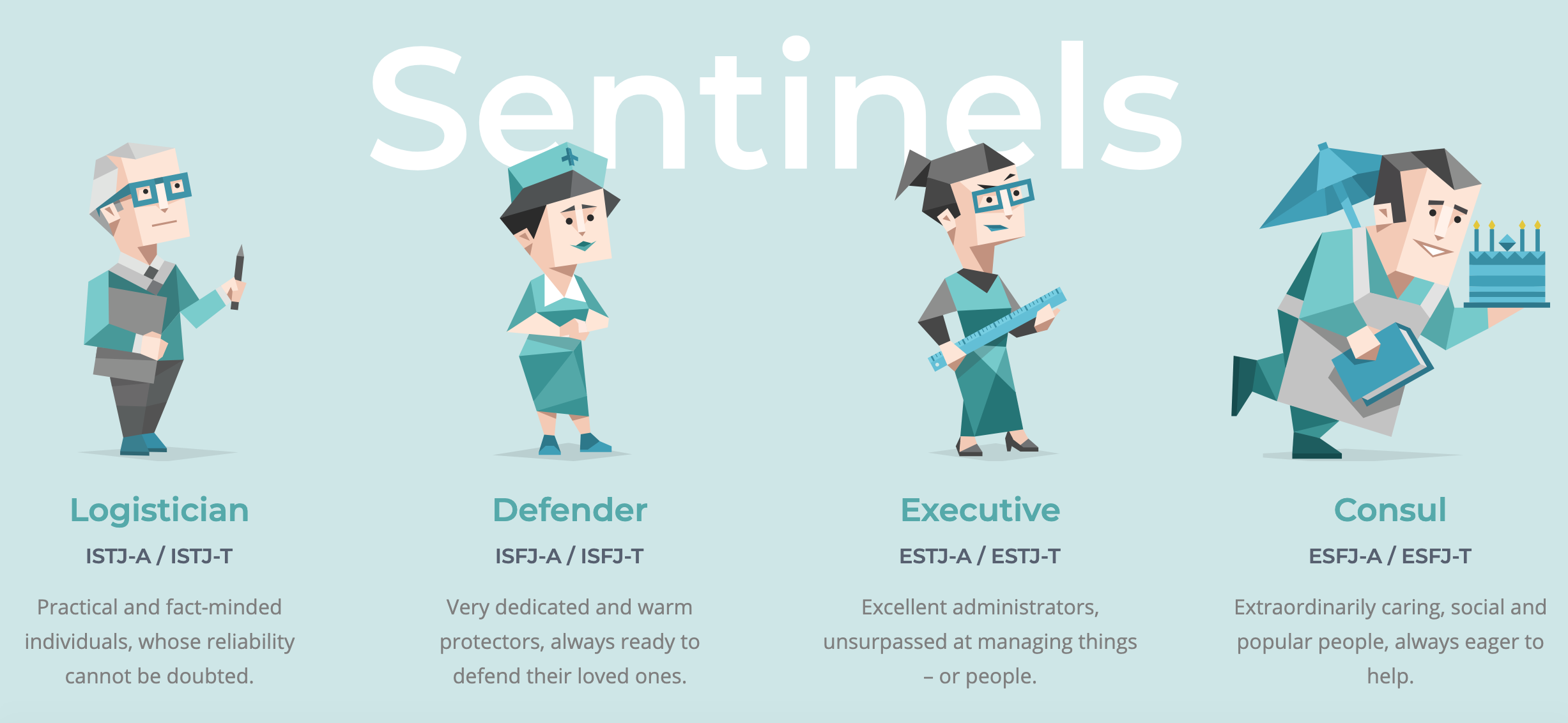Personality Types: I’m an ENTP – What Are You?
I love Myers Briggs – but before I tell you why, I probably should explain what the heck it is.
Myers Briggs is a personality framework created by Isabel Briggs Myers and her mother, Katharine Cook Briggs. (I promise I don’t just love it just because women invented it, including an ‘Isabel’ – although it does make me feel weirdly special for some reason.)
Myers Briggs is based on the idea that humans experience the world using four psychological functions – sensation, intuition, feeling and thinking – and that one of these sensations is always dominant. Each personality type is represented by four letters. For example, I’m an ENTP. (So is Celine Dion, Mark Twain, Tyrion Lannister and Captain Jack Sparrow, just to put that in perspective.)
I’ll break down what the letters mean below, but for the half of you thinking ‘why does this even matter?’ (The other half will have already scrolled down to find the quiz button.) Firstly, you’re such an S. (That’ll make sense below.)
Secondly, this is why:
Self Awareness – Self awareness is the most underrated ability there is. Being self aware is empowering. It’s understanding how you operate, how you think, what you’re good at and what you're not. The more self aware you become, the more you learn to love and accept yourself, and lean into your strengths and abilities.
Relationships – Understanding your personality type helps you build healthier relationships, by understanding how you process problems, how you recharge, how you order your life, realising someone else may be different.
Career – Let’s be honest, the work place is a minefield. It’s a melting pot of people who work, think, feel and make decisions differently, which is why understanding your personality type, as well as that of those around you, can help. You can learn to work to your strengths, respect others and their ways of working, and grow stronger, more productive teams.
That all sounds super helpful, doesn’t it? (That was rhetorical – of course it does.) So, what do the letters mean?
Introversion vs. Extraversion
You’re either an I or an E (and it has nothing to do with C). Being and introvert or extrovert isn’t about being shy or friendly, but about how you’re energised and how you process problems, thoughts and ideas.
Introverts draw energy by spending time alone and/or with a small group, while extroverts are energised by being with people in lively and busy environments. Introverts generally process problems, ideas and thoughts alone, as it’s how they think best. While extroverts process out loud.
Personally, I love (often need) to talk it through. I love heated debates, discussing ideas and loud brainstorms. But for an introvert, that probably sounds like hell.
My boyfriend is an introvert, while (if you haven’t worked it out), I’m an extrovert. He loves to argue with me, but he generally processes most problems in his head, then brings me the solution. As I like to process out loud – debrief, talk it through twenty times, hash it out – that can be incredibly frustrating. But understanding that we work through things differently has been key to me not throttling him.
Same goes for work. Consider personality types next time your team needs to be energised and inspired –what works best for you might be different to the person next to you.
Sensing vs. Intuition
Sensing and intuition delves into how you process information. Senors rely more on their five senses – touch, taste, hear, smell, see – while intuitives are more interested in theories, patterns and explanations.
Sensors are more “practical”, while intuitives are more “abstract”. For instance, if Myers-Briggs as a concept fascinates you, you’re likely an ‘Intuitive’. (I’m an ‘Intuitive’ – a strong one, at that.)
In a practical sense, it means you often need to deliver the same information in multiple ways. For instance, say you’re trying to implement a new business initiative, a sensor needs to understand what it means practicality – what’s required of them, how they do it, etc – while an intuitive might prefer to understand the theory behind it. Why is it being done that way, what’s the theory and the concept behind it? When you explain things in a way people understand, they listen.
Thinking vs. Feeling
Thinking and feeling reflects how you make decisions. Thinkers are rational and make decisions based on facts and logic, while feelers make decisions based on theirs or other’s emotions.
A thinker’s strength is their rationality, while a feeler’s strength is their sympathy. Thinkers are great at firing people (as long as they agree with the logic) – my dad and boyfriend are both strong ‘Thinkers’, meaning they often don’t consider anyone’s feelings. I’m a ‘Thinker’ too, although to a much lesser degree.
Be aware of how you make decisions. In relationships, understanding whether someone is a ‘Thinker’ or a ‘Feeler’ can save a lot of arguments and hurt.
When it comes to business and your career, the key is often to find someone who’s the opposite of you. If you do, you’ll make better decisions that are based on all outcomes and reactions.
Judging vs. Perceiving
The last one is about how you approach structure in your life.
Judgers are organised – they’re planners, they’re detailed oriented, they’re on time and they dislike last-minute changes. Perceivers are flexible – often easily distracted, and always open to new ideas. Perceivers like to leave things open so they can change their minds.
The best teams have both. You want a ‘Judger’ in charge of your plans and timelines, as they’ll make sure you stick to it and consider all the details. While a ‘Perceiver’ is better off leading the early stages of a project – gathering information, generating ideas and sparking inspiration. Lean in to your natural tendencies, give people tasks that suit their abilities, and your team will be stronger for it.
It’s important to note that you could be a combination of each of the letters, but one always tends to be dominant. And, of course, there is no right or wrong personality (though I do admit, I wish I was the same as Oprah).
Famous People’s Personality Types (‘Cos it’s Fun)
Knowing your personality type can be an important step to understanding yourself, in being a better friend, partner, sibling, daughter or son, colleague, manager, leader and human. It’s helps you own who you are. And you should own it – we’re all different and it’s what makes the world a magical place.






